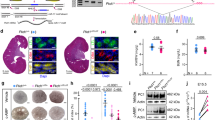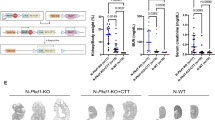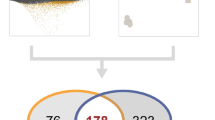Abstract
Autosomal recessive polycystic kidney disease (ARPKD) is caused by mutations in the PKHD1 (polycystic kidney and hepatic disease 1) gene on chromosome 6p12. The longest continuous open reading frame comprises 66 exons encoding a novel 4,074 aa multidomain integral membrane protein (polyductin/fibrocystin) of unknown function. Various alternatively spliced transcripts may additionally result in different isoproteins. Overall, the large size of PKHD1, its complex pattern of splicing, multiple allelism and lack of knowledge of the encoded protein’s/proteins’ functions pose significant challenges to DNA-based diagnostic testing. Nucleotide substitutions, particularly if residing in regulatory elements or introns outside the splice consensus sites, are often difficult to assess without further functional analyses and cannot be unambiguously classified as disease-associated. Investigations on the transcript level, however, are hampered as PKHD1 is not widely expressed in blood lymphocytes. We thus determined the functional significance of the novel splice site mutation c.53-3C>A in intron 2 by RNA analyses by minigene-construction. The mutant allele was shown to cause skipping of exon 3. Thus, given the minigene results together with 400 control chromosomes negative for this change, segregation of the mutation with the phenotype, and a significant lowering of the strength of the splice site by bioinformatics, the mutant allele is most likely pathogenic. To the best of our knowledge, this is the first study that defines the consequences of a PKHD1 splice mutation and underlines the relevance of functional analyses in determining the pathogenicity of changes of unknown significance.
Similar content being viewed by others
Log in or create a free account to read this content
Gain free access to this article, as well as selected content from this journal and more on nature.com
or
References
Ars E, Serra E, Garcia J, Kruyer H, Gaona A, Lazaro C, Estivill X (2000) Mutations affecting mRNA splicing are the most common molecular defects in patients with neurofibromatosis type 1. Hum Mol Genet 9:237–247
Baralle D, Baralle M (2005) Splicing in action: assessing disease causing sequence changes. J Med Genet 42:737–748
Bergmann C, Senderek J, Sedlacek B, Pegiazoglou I, Puglia P, Eggermann T, Rudnik-Schoneborn S, Furu L, Onuchic LF, De Baca M, Germino GG, Guay-Woodford L, Somlo S, Moser M, Buttner R, Zerres K (2003) Spectrum of mutations in the gene for autosomal recessive polycystic kidney disease (ARPKD/PKHD1). J Am Soc Nephrol 13:76–89
Bergmann C, Senderek J, Küpper F, Schneider F, Dornia C, Windelen E, Eggermann T, Rudnik-Schoneborn S, Kirfel J, Furu L, Onuchic LF, Rossetti S, Harris PC, Somlo S, Guay-Woodford L, Germino GG, Moser M, Buttner R, Zerres K (2004a) PKHD1 mutations in autosomal recessive polycystic kidney disease (ARPKD). Hum Mutat 23:453–63
Bergmann C, Senderek J, Schneider F, Dornia C, Kupper F, Eggermann T, Rudnik-Schoneborn S, Kirfel J, Moser M, Buttner R, Zerres K (2004b) PKHD1 mutations in families requesting prenatal diagnosis for autosomal recessive polycystic kidney disease (ARPKD). Hum Mutat 23:487–95
Bergmann C, Senderek J, Windelen E, Küpper F, Middeldorf I, Schneider F, Dornia C, Rudnik-Schöneborn S, Konrad M, Schmitt CP, Seeman T, Neuhaus TJ, Vester U, Kirfel J, Büttner R, Zerres K, the Arbeitsgemeinschaft für Pädiatrische Nephrologie (APN) (2005a) Clinical consequences of PKHD1 mutations in 164 patients with autosomal recessive polycystic kidney disease (ARPKD). Kidney Int 67:829–848
Bergmann C, Küpper F, Dornia C, Schneider F, Senderek J, Zerres K (2005b) Algorithm for efficient PKHD1 mutation screening in autosomal recessive polycystic kidney disease (ARPKD). Hum Mutat 25:225–231
Black DL (2003) Mechanisms of alternative pre-messenger RNA splicing. Annu Rev Biochem 72:291–336
Furu L, Onuchic LF, Gharavi A, Hou X, Esquivel EL, Nagasawa Y, Bergmann C, Senderek J, Avner E, Zerres K, Germino GG, Guay-Woodford LM, Somlo S (2003) Milder presentation of recessive polycystic kidney disease requires presence of amino acid substitution mutations. J Am Soc Nephrol 14:2004–2014
Guay-Woodford LM (1996) Autosomal recessive polycystic kidney disease: clinical and genetic profiles. In: Watson ML, Torres VE (eds) Polycystic kidney disease. Oxford University Press, Oxford, pp 237–266
Guay-Woodford LM, Desmond RA (2003) Autosomal recessive polycystic kidney disease: the clinical experience in North America. Pediatrics 111:1072–1080
Hiesberger T, Gourley E, Ward CJ, Hurd T, Harris PC, Margolis B, Igarashi P (2005) Primary cilia-dependent Ca2+ signalling induces the proteolytic cleavage and nuclear translocation of fibrocystin. J Am Soc Nephrol 16, ASN Renal Week Abstracts Issue
Kaimori JY, Nagasawa Y, Garcia-Gonzales MA, Menezes LF, Onuchic LF, Guay-Woodford LM, Germino GG (2005) The PKHD1 product, polyductin/fibrocystin, undergoes Notch-like posttranslational processing. J Am Soc Nephrol 16, ASN Renal Week Abstracts Issue
Krawczak M, Reiss J, Cooper DN (1992) The mutational spectrum of single base-pair substitutions in mRNA splice junctions of human genes: causes and consequences. Hum Genet 90:41–54
Losekoot M, Haarloo C, Ruivenkamp C, White SJ, Breuning MH, Peters DJ (2005) Analysis of missense variants in the PKHD1-gene in patients with autosomal recessive polycystic kidney disease (ARPKD). Hum Genet 118:185–206
Masyuk TV, Huang BQ, Ward CJ, Masyuk AI, Yuan D, Splinter PL, Punyashthiti R, Ritman EL, Torres VE, Harris PC, Larusso NF (2003) Defects in cholangiocyte fibrocystin expression and ciliary structure in the PCK rat. Gastroenterology 125:1303–1310
Masyuk TV, Muff MA, Huang BQ, Ward CJ, Punyashthiti R, Masyuk AI, Torres VE, Harris PC, LaRusso NF (2005) Functional implications of topographical distribution of fibrocystin in cholangiocytes. J Am Soc Nephrol 16, ASN Renal Week Abstracts Issue
Menezes LF, Cai Y, Nagasawa Y, Silva AM, Watkins ML, Da Silva AM, Somlo S, Guay-Woodford LM, Germino GG, Onuchic LF (2004) Polyductin, the PKHD1 gene product, comprises isoforms expressed in plasma membrane, primary cilium, and cytoplasm. Kidney Int 66:1345–1355
Nagasawa Y, Matthiesen S, Onuchic L, Hou X, Bergmann C, Esquivel E, Senderek J, Ren Z, Zeltner R, Furu L, Avner E, Moser M, Somlo S, Guay-Woodford L, Buttner R, Zerres K, Germino GG (2002) Identification and characterization of Pkhd1, the mouse orthologue of the human ARPKD gene. J Am Soc Nephrol 13:2246–2258
Onuchic LF, Furu L, Nagasawa Y, Hou X, Eggermann T, Ren Z, Bergmann C, Senderek J, Esquivel E, Zeltner R, Rudnik-Schoneborn S, Mrug M, Sweeney W, Avner ED, Zerres K, Guay-Woodford LM, Somlo S, Germino GG (2002) PKHD1, the polycystic kidney and hepatic disease 1 gene, encodes a novel large protein containing multiple immunoglobulin-like plexin-transcription-factor domains and parallel beta-helix 1 repeats. Am J Hum Genet 70:1305–1317
Rossetti S, Torra R, Coto E, Consugar M, Kubly V, Malaga S, Navarro M, El-Youssef M, Torres VE, Harris PC (2003) A complete mutation screen of PKHD1 in autosomal-recessive polycystic kidney disease (ARPKD) pedigrees. Kidney Int 64:391–403
Sharp AM, Messiaen LM, Page G, Antignac C, Gubler MC, Onuchic LF, Somlo S, Germino GG, Guay-Woodford LM (2005) Comprehensive genomic analysis for PKHD1 mutations in ARPKD cohorts. J Med Genet 42:336–349
Teraoka SN, Telatar M, Becker-Catania S, Liang T, Onengut S, Tolun A, Chessa L, Sanal O, Bernatowska E, Gatti RA, Concannon P (1999) Splicing defects in the ataxia-telangiectasia gene, ATM: underlying mutations and consequences. Am J Hum Genet 64:1617–1631
Wang S, Luo Y, Wilson PD, Witman GB, Zhou J (2004) The autosomal recessive polycystic kidney disease protein is localized to primary cilia, with concentration in the basal body area. J Am Soc Nephrol 15:592–602
Ward CJ, Hogan MC, Rossetti S, Walker D, Sneddon T, Wang X, Kubly V, Cunningham JM, Bacallao R, Ishibashi M, Milliner DS, Torres VE, Harris PC (2002) The gene mutated in autosomal recessive polycystic kidney disease encodes a large, receptor-like protein. Nat Genet 30:259–269
Ward CJ, Yuan D, Masyuk TV, Wang X, Punyashthiti R, Whelan S, Bacallao R, Torra R, LaRusso NF, Torres VE, Harris PC (2003) Cellular and subcellular localization of the ARPKD protein; fibrocystin is expressed on primary cilia. Hum Mol Genet 12:2703–2710
Zerres K, Mücher G, Becker J, Steinkamm C, Rudnik-Schöneborn S, Heikkila P, Rapola J, Salonen R, Germino GG, Onuchic L, Somlo S, Avner ED, Harman LA, Stockwin JM, Guay-Woodford LM (1998) Prenatal diagnosis of autosomal recessive polycystic kidney disease (ARPKD): molecular genetics, clinical experience, and fetal morphology. Am J Med Genet 76:137–144
Zerres K, Rudnik-Schöneborn S, Senderek J, Eggermann T, Bergmann C (2003) Autosomal recessive polycystic kidney disease (ARPKD). J Nephrol 16:453–458
Zhang MZ, Mai W, Li C, Cho SY, Hao C, Moeckel G, Zhao R, Kim I, Wang J, Xiong H, Wang H, Sato Y, Wu Y, Nakanuma Y, Lilova M, Pei Y, Harris RC, Li S, Coffey RJ, Sun L, Wu D, Chen XZ, Breyer MD, Zhao ZJ, McKanna JA, Wu G (2004) PKHD1 protein encoded by the gene for autosomal recessive polycystic kidney disease associates with basal bodies and primary cilia in renal epithelial cells. Proc Natl Acad Sci USA 101:2311–2316
Acknowledgments
The authors would like to thank the family involved in this study for their cooperation. We are also grateful to Professor Michael Krawczak for sharing information on human mutation data. The technical assistance of Elvira Golz-Staggemeyer, Edith Bünger, and Edith von Heel is gratefully acknowledged. This work was supported by the Deutsche Forschungsgemeinschaft (DFG) (K.Z.) and the START program of the medical faculty of Aachen University (C.B.). C.B. is a recipient of a scholarship from the German Kidney Foundation (Deutsche Nierenstiftung).
Author information
Authors and Affiliations
Corresponding author
Additional information
Data access
OMIM: 606702 (PKHD1), 263200 (ARPKD); GDB: 433910; GenBank: NM_138694.2, AF480064, AY074797, AY129465; http://www.humgen.rwth-aachen.de (PKHD1 mutation database).
Rights and permissions
About this article
Cite this article
Bergmann, C., Frank, V., Küpper, F. et al. Functional analysis of PKHD1 splicing in autosomal recessive polycystic kidney disease. J Hum Genet 51, 788–793 (2006). https://doi.org/10.1007/s10038-006-0022-4
Received:
Accepted:
Published:
Issue date:
DOI: https://doi.org/10.1007/s10038-006-0022-4
Keywords
This article is cited by
-
A rare deep intronic mutation of PKHD1 gene, c.8798-459 C > A, causes autosomal recessive polycystic kidney disease by pseudoexon activation
Journal of Human Genetics (2019)
-
Functional splicing analysis in an infantile case of atypical hemolytic uremic syndrome caused by digenic mutations in C3 and MCP genes
Journal of Human Genetics (2018)
-
An in vitro splicing assay reveals the pathogenicity of a novel intronic variant in ATP6V0A4 for autosomal recessive distal renal tubular acidosis
BMC Nephrology (2017)
-
In vivo and in vitro splicing assay of SLC12A1 in an antenatal salt-losing tubulopathy patient with an intronic mutation
Human Genetics (2009)



